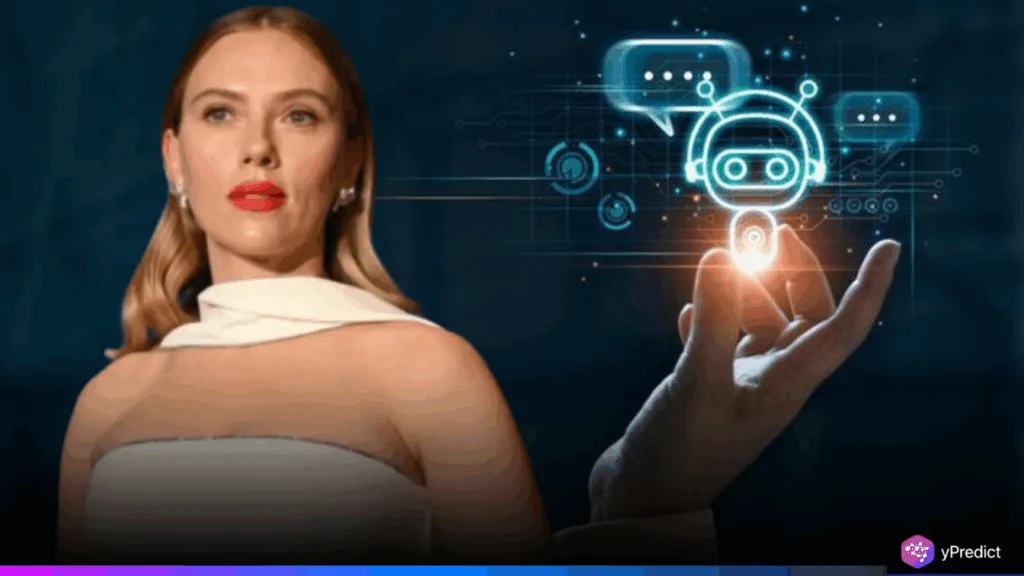
Scarlett Johansson is once again voicing serious concerns about artificial intelligence. In a new interview with The Sunday Times, the actress said she doesn’t believe AI can replicate the emotional depth of human performance. Though Johansson recognized the potential of AI as a tool to achieve the objectives of cinematographers, she insisted that creatives should not use it in place of creativity. She cautioned against the use of AI because it ignores the border between truth and fiction and puts reality at risk. The position of Johansson indicates an increasing fear among the creators that are concerned that AI will overtake their work without explicit permission or control.
The ‘Sky’ Voice Controversy and Legal Pushback
In 2024, Johansson revealed she declined an offer from OpenAI to voice ChatGPT’s assistant, “Sky,” citing personal reasons. Months later, when “Sky” launched, many, including Johansson’s close friends, believed the voice sounded nearly identical to hers. Johansson was outraged, claiming OpenAI had ignored her decision and chosen a voice intentionally resembling hers. Adding to the controversy, OpenAI CEO Sam Altman tweeted the word “her,” referencing the 2013 film Her, where Johansson voiced an AI character. Johansson said Altman’s behavior appeared deliberate and misleading. After hiring legal counsel, Johansson’s team demanded answers. OpenAI responded by taking down “Sky” and claimed the voice was that of a different actress.
However, Johansson insisted on transparency. In a public statement, she said, “In a time when we are all grappling with deepfakes and the protection of our own likeness… these are questions that deserve absolute clarity.” This incident, and similar deepfake appearances falsely attributed to her, have fueled Johansson’s call for stronger federal regulation on AI and voice rights. She believes artists deserve legal protection when their voices and likenesses are copied or simulated without permission. Her case has now become a landmark in the debate over ethical AI development.
AI’s Threat to Trust, Identity, and Social Stability
Beyond copyright issues, Johansson fears AI could erode public trust. “When does it threaten to blur the line between truth and reality? That’s a threat,” she said. She warned that society relies on shared truths, and AI’s ability to fabricate believable content threatens that foundation. The issue grew in intensity when someone released a deepfake of Johansson featuring her likeness in a video about a geopolitical clash. She called the manipulation a fearful thing, adding that developers may apply the tools of AI to create persuasive falsehoods to mislead people.
She urged the U.S. government to follow the lead of other nations and prioritize legislation that safeguards identity and expression. “There is a 1000-foot wave coming regarding AI,” she said, criticizing Washington’s slow response. She is calling in a global sense and not just Hollywood. Johansson emphasized the threats AI poses to the creators, journalists, and teachers, as well as the legal system. Unchecked, she cautioned, artificial intelligence would produce misinformation.
Other works of synthetic media disrupt elections, promote social polarization, and set forth untrue stories. She feels that bipartisan solutions are necessary and that Congress must enact policies to deal with deepfakes, identity theft, and misappropriation of biometric analytics. The message that Johansson is sending is this: it is not only about the right to privacy of celebrities, but also their personal identity and the sanctity of any information that people share in the digital era.
Johansson’s Stand Echoes a Global Wake-Up Call
Scarlett Johansson’s fight against unauthorized AI use isn’t just personal; it’s a signal to the world. Her experience with OpenAI’s “Sky” voice and recent deepfake incidents highlights how quickly AI can be used to manipulate perception and identity. She’s now urging lawmakers to act decisively. With AI evolving rapidly, Johansson believes time is running out. “AI threatens the foundation of trust,” she said. As governments scramble to catch up, Johansson’s advocacy is adding momentum to a global push for ethical AI standards. For her, and many others, protecting creativity, identity, and truth has never felt more urgent.






